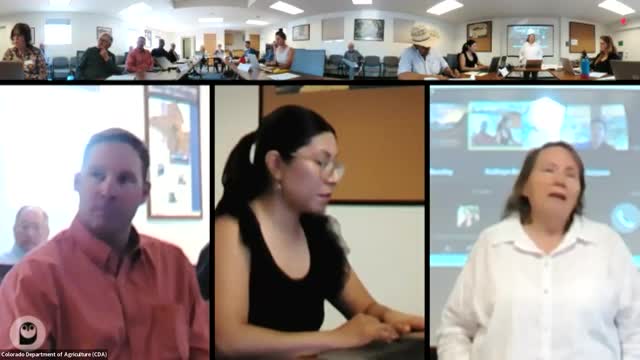Local Communities Struggle Against Overwhelming Tourism Impact
July 13, 2024 | Department of Agriculture, State Agencies, Organizations, Executive, Colorado

This article was created by AI summarizing key points discussed. AI makes mistakes, so for full details and context, please refer to the video of the full meeting. Please report any errors so we can fix them. Report an error »

During a recent government meeting, officials discussed the growing concerns surrounding tourism's impact on local communities, particularly in Colorado's mountain regions. Residents expressed frustration over the influx of visitors, which has strained local infrastructure and made essential goods scarce. One participant highlighted the challenges of grocery shopping during peak tourist days, noting that staples like milk and eggs often run out due to high demand.
The conversation also touched on transportation issues, with a proposal to convert rail lines into commuter trains aimed at alleviating traffic congestion. While this initiative was welcomed, concerns were raised about the existing relationship between agricultural operations and railroads, particularly regarding maintenance of right-of-ways and fencing. Participants shared anecdotes about livestock straying onto railroad tracks and the subsequent challenges this poses for both farmers and local businesses.
Additionally, the meeting addressed environmental issues, including the impact of beaver activity on agricultural land, which has led to flooding and changes in vegetation that hinder farming efforts. The need for clear management responsibilities regarding rail infrastructure was emphasized to prevent further complications.
Lastly, a participant raised a unique concern about the proliferation of discount stores, questioning whether the phenomenon dubbed \"death by Dollar General\" could threaten local economies. This issue, which has reportedly emerged in other states, reflects broader anxieties about the sustainability of small-town businesses in the face of corporate retail expansion. The discussions underscored the complex interplay between tourism, agriculture, and local economies, highlighting the need for strategic planning to address these multifaceted challenges.
The conversation also touched on transportation issues, with a proposal to convert rail lines into commuter trains aimed at alleviating traffic congestion. While this initiative was welcomed, concerns were raised about the existing relationship between agricultural operations and railroads, particularly regarding maintenance of right-of-ways and fencing. Participants shared anecdotes about livestock straying onto railroad tracks and the subsequent challenges this poses for both farmers and local businesses.
Additionally, the meeting addressed environmental issues, including the impact of beaver activity on agricultural land, which has led to flooding and changes in vegetation that hinder farming efforts. The need for clear management responsibilities regarding rail infrastructure was emphasized to prevent further complications.
Lastly, a participant raised a unique concern about the proliferation of discount stores, questioning whether the phenomenon dubbed \"death by Dollar General\" could threaten local economies. This issue, which has reportedly emerged in other states, reflects broader anxieties about the sustainability of small-town businesses in the face of corporate retail expansion. The discussions underscored the complex interplay between tourism, agriculture, and local economies, highlighting the need for strategic planning to address these multifaceted challenges.
View full meeting
This article is based on a recent meeting—watch the full video and explore the complete transcript for deeper insights into the discussion.
View full meeting
